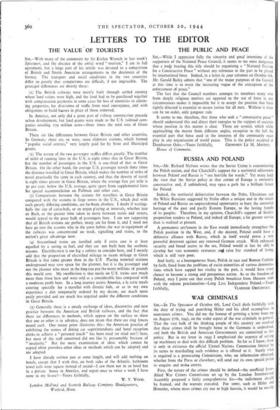LETTERS TO THE EDITOR
THE VALUE OF TOURISTS
SIR,—With many of the comments by Sir Evelyn Wrench in last week's Spectator, and the absence of the awful word " tourism," I am in full agreement, but a large part of his article was devoted to a comparison of British and North American arrangements to the detriment of the former. The transport and social conditions in the two countries differ so greatly that comparisons are difficult, if not impossible. The principal differences are shortly these:
(I) The British railways were mainly built through settled country where land values were high, and the land had to be purchased together with compensation payments in some cases for loss of amenities to adjoin- ing properties, for diversions of traffic from road conveyance, and with obligations to build houses in place of those removed.
In America, not only did a great part of railway construction precede urban development, but land grants were made to the U.S. railroad com- panies totalling 179 million acres—three times the total area of Great Britain.
There are like differences between Great Britain and other countries. In Germany there are, or were, some elaborate stations, which formed popular social centres," very largely paid for by State and Municipal grants.
(2) The nature of the two passenger traffics differs greatly. The number of mild of running lines in the U.S. is eight times that in Great Britain, but the number of passengers in the U.S. is one-third of that in Great Britain. On the other hand, the average U.S. passenger travels three times the distance travelled in Great Britain, which makes the number of miles of travel practically the same in each country, and thus the density of travel is eight times greater in Great Britain, where the average fare per mile is 3o per cent. below the U.S. average, quite apart from supplemental fares for special accommodation on Pullman and other cars.
(3) Comparisons between the stations for travellers in Great Britain compared with the stations in large towns in the U.S., which deal with such greatly differing conditions, are far-from absolute. I doubt if waiting- halls the size of cathedrals, or an organ p!aying at intervalst whether jazz or Bach, or the greater time taken to move between trains and streets, would appeal to the great bulk of passengers here. I am not suggesting that all British stations are perfect, many are far from it, and I need not here go into the reasons why in the years before the war re-equipment of the railways was concentrated on track, signalling and trains, to the nation's great advantage now.
(4) Streamlined trains are justified only if extra cost is at least equalled by a saving in fuel, and they are not built here for aesthetic reasons. Electrificatien is too big a subject to consider here, and I merely add teat the proportion of electrified mileage to steam mileage in Great Britain is five times greater than in the U.S Placing terminal stations underground may save space for the planner, but it is the passenger and not the planner who must in the long run pay the many millions of pounds this would cost. My recollection is that meals on U.S. trains cost much more than those here and were sold at a considerable loss compared with a moderate profit here. In a long journey across America, a la carte meals catering specially for a traveller with dietetic fads, or as in my own experience a diet temporarily ordered by my doctor, are much more easily provided and are much less required under the different conditions in Great Britain.
(5) Generally there is a steady exchange of ideas, discoveries and new practice between the American and British railways, and the fact that there are differences in methods, which appear on the surface to show that one or other is in advance, does not mean that there are ring fences round each. One minor point illustrates this: the American practice of exhibiting the names of dining car superintendents and hotel reception clerks to achieve a " personal touch " has been tried (or tried out!) here, but most of the staff concerned did not like it; presumably because of " insularity." But the mere examination of ideas which cannot be copied often provokes other ideas or methods which can be adopted and are adopted.
I have already written you at some length, and will add nothing on hotels, except that I wish that, on both sides of the Atlantic, bathroom towel rails were square instead of round—I saw them not in an hotel but in a private house in America, and regret once or twice a week I have none in my house!—Yours faithfully,
W. V. WOOD.
London Midland and Scottish Railway Company Headquarters, Watford, Herts.


























 Previous page
Previous page